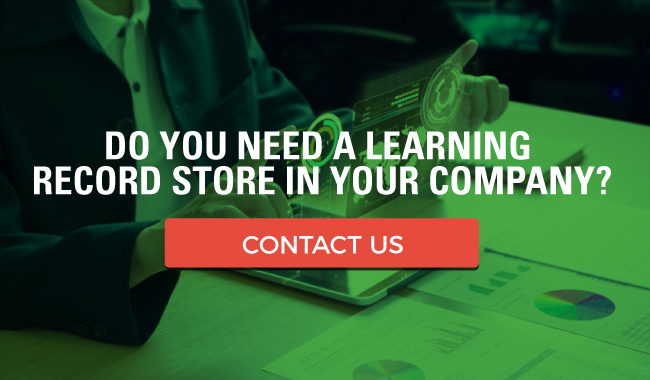- Want to promote informal learning in your company?
- Need to keep track of online and offline training?
- Your main challenge when tracking a learning experience in your business is the lack of actionable data?
- Do you want to track each of your employees' progress at a detailed level, in real-time?
- Do your students access training content from multiple sources (from LMS to other third-party learning applications)?
If you answered yes to one or some of these questions...
Then you'll be interested to learn more about xAPI and LRS technologies in the corporate training environment. For learning and development leaders, getting acquainted with these concepts is key to implementing a training strategy that responds to the technological changes and new context we live in today.
What are LRS and xAPI?
In 2001, LMS (Learning Management System) communication through SCORM (Shareable Content Object Reference Model) was established as a standard model for most eLearning courses.
The innovative and functional 20 years ago became limited over time. These systems evolved and today we know them as LRS (Learning Record Store) and xAPI.
Better learning experiences, access to learning from multiple devices, data centralization, and obtaining countless data and reports in real-time from different apps, are some of the factors that pressed for the development of these new technologies for the eLearning world.
According to ATD, xAPI is defined as a simple and lightweight way to store and retrieve student records and share this data across platforms. These logs (known as activity declarations) can be captured in a consistent format of myriad sources (known as activity providers) and added to a learning log store (LRS). The LRS is analogous to the SCORM database on an LMS.
The role of this API is so valuable today as the previous specifications were complicated and very limited, but this one is simple and flexible. Mobile learning, gamification, social learning, offline learning are examples of the type of experiences that can now be tracked thanks to this technology.
The LRS (Learning Record Store) is a database that collects and stores information from all points of contact that employee-students have with training-learning created with the xAPI standard. The LRS and xAPI, synched with other third-party tools, work to expand the boundaries of learning in companies.
Read more here: LMS vs. LRS: How and Why They're Different
How does it all work?
An LRS uses xAPI to collect student data or experiences from both online and offline sources. These experiences are reported to the LRS in the form of xAPI declarations, where they are stored. These statements can be retrieved to inform and analyze student data. Typically, an LRS will provide reports and analytics created specifically for these purposes.
Also read: Understanding the differences between an LMS platform and an LRS for business
If your company hasn't adopted these technologies, in this article we mention 5 reasons why an LRS is essential for companies today:
Reason #1: Beyond an LMS: Expand Your Possibilities
Traditionally, a learning management system (LMS) informed you only about the data within that system. It is limited when tracking learning that happens throughout the company (offline and outside the LMS - social networks for example).
Thanks to the new LRS technology intertwined with xAPI, it is possible to access valuable knowledge about the learning experience of each employee and infinite possibilities regarding data analysis and reports.
It will track activities no matter where learning activities happen (LMS, CRM, or HRMS); the LRS will be able to record and store each learning experience.
Important note: Some people may assume that the LRS will replace your LMS. However, this will not always be the case. Sometimes your LMS is likely to do more than simply record and store SCORM transactions to support formal learning experiences. You probably manage users, enrollments, class sessions, assignments, discussion groups, and run reports. For many organizations, these features will still be required in an xAPI environment, so the LMS will still be useful. One or more LRSs, whether integrated into or together with the LMS, will support tracking any other learning experience.
Reason #2: Improves ROI Analysis
Managing modern workers effectively is a critical factor for business success. Therefore, it becomes essential to quickly analyze training program data to design optimal learning experiences, aligned with business objectives and track business success.
LRS and xAPI technologies open a world of opportunities for all training and development professionals. The days of viewing only the completion of tasks and evaluations have been left behind. Stakeholders are now able to analyze contextual data obtained in real-time to take actions that immediately impact the company's bottom-line.
Training leaders are now able to link the data obtained from the employee's learning to their performance at work. Centralizing and streamlining these processes increases the chances of boosting the company's profits. So, if your company needs to track a large number of learning activities from different sources, an LRS will be very helpful. Collecting all these activities gives you more data points to analyze. It's Big Data for eLearning.
Also read: What are Micro-Moments? And how to leverage them in your eLearning strategy?
Reason #3: Improves the Learning Experience
Through LRS and xAPI standards, it is now possible to track student engagement, progress, and performance, as well as the effectiveness of training programs – thus allowing corporate learning leaders to substantially improve the quality of the learning experience.
Why? Well, the LRS allows you to record data about how your employees access learning content, regardless of the devices they use. A wide variety of experiences can also be tracked, including informal learning activities, mobile app interactions, and even job performance activities. For example, with these technologies, you can obtain reports that tell us which pages are most visited by workers and which have the highest volume of clicks on the "Discover More" button. The results of these analyses may indicate that additional interactivity is necessary to bring users to the relevant information.
Tracking data that reflects employee performance and performance, what they learn, how they learn it, and where are they struggling, allows the training and development leader to improve learning content and continuously be determining which programs are effective and which are not.
Reason #4: Supports Multi-device Learning
As an industry, we finally stopped thinking that mobile learning courses are separate from the rest of the online learning experiences.
Currently, our students will access content at any time and from any device, not just smartphones, we should consider multi-device learning as the new norm.
Also read: How do eLearning and mLearning differ?
The LMS system is very limited to today's demands. Fortunately, if you already have an LMS in your company, you can pair it with the combination of xAPI and LRS to report data in an integrated way for any mobile device.
With the LRS and the xAPI technology, training and development leaders can:
- Track mobile learning, games and real-world performance
- Work on any device, disregarding whether it is connected to the Internet
- Run on outside of a web-browser (e.g. native iPhone app)
All this means that having a Learning Record Store in your company and being able to store and analyze more than the traditional learning activities, empowers you to deliver a richer learning environment: Immersive, interactive, adaptive - that supports how modern workers learn.
Also read:
What Do Modern Learners Actually Want From Your eLearning Courses?
Evolving Your eLearning Courses for Modern Workers
Reason #5: Offline Learning = Flexible learning
As mentioned above, SCORM cannot track all offline learning-related activities in your company. In contrast, with xAPI + LRS technology you can track even offline activities. This means that with this technology, you can track learning even if students are not online. They do it offline and when they resume their network connection, your learning experiences will be uploaded to the database and you will be able to track the learning experience.
While SCORM allows the creation and publishing of courses within an LMS, xAPI is not limited to the LMS alone. Any software or system that supports xAPI can be crawled using xAPI.
So how are these learning activities, which take place in various offline environments, stored and tracked? This is where the LRS or Learning Record Store comes in. The LRS can be independent, part of an LMS, or part of any other system. A learning log store is at the heart of xAPI and stores all learning activities in the form of a specification called "Activity Statements". When a student participates in an activity, such as pausing a video, an activity flow statement is sent to a Learning Registration System (LRS) that says "X paused the video". Therefore, each activity in a student is tracked, logged, and stored within an LRS.
One of the great benefits of being able to track offline activities is the fact that it can help you motivate employees to participate and complete different types of activities. For example, if you have noticed that your students are not motivated to participate in offline activities (classroom training for instance) this may be because part of human nature gives our best when we know that we are recognized for our work. For offline activities, because it's not tracked as thoroughly as online, students aren't motivated to do them. But integrating your offline activities with xAPI+LRS can also reduce this challenge big time.
Also read: Learn How to Track Informal and Social Learning with xAPI
Additional read: If Your Company Already Has A #Datalake, Do You Need An #LRS?
LRS and xAPI: A World Of Possibilities For Your Training
If you currently use an LMS (such as Moodle, Totara Learn, or any xAPI-compatible platform) and want to enhance the learning possibilities of your students or employees, the next step is to adopt xAPI and LRS technologies in your company, as well as a tool like SHIFT to achieve this.
Not only will it help your eLearning training strategy reach the next level, but it will also give you much more detailed information about the behavior and performance of your workers.
Certainly, the adoption of an LRS depends on its goals, objectives, and resources. If you would like our advice on the subject, please contact us here.
Sources:
Floro, Nick. Mobile Learning. October 2011.
UNESCO. Touch and Mobile Technologies for the Classroom session 4
You might want to check out these articles:
- Is M-learning versus E-learning or are they supporting each other?
- Mobile Learning versus E-Learning – Is There a Difference?
- mLearning: The Way of Learning Tomorrow
- The Different Uses of E-learning and M-learning
- Desktop Versus Mobile Learning
- mLearning Is Not eLearning on A Mobile Device
- From E-Learning to M-Learning: A Different Beast
- Right Time and Place: mLearning Use Cases


